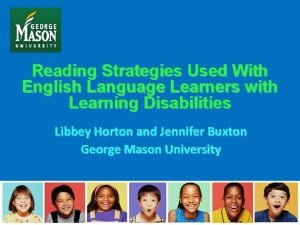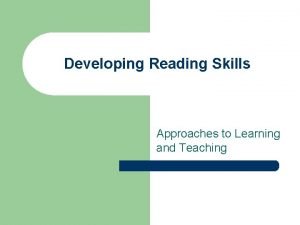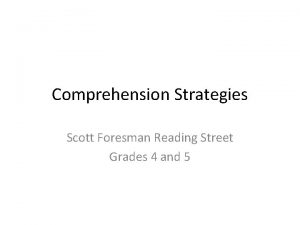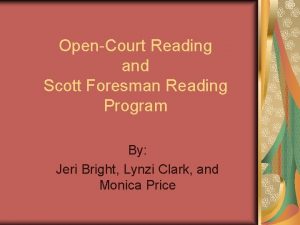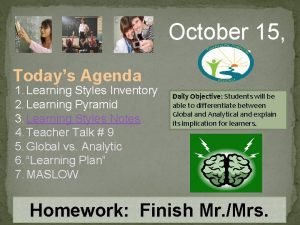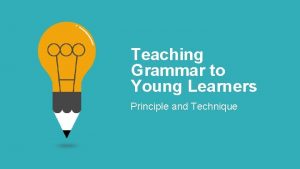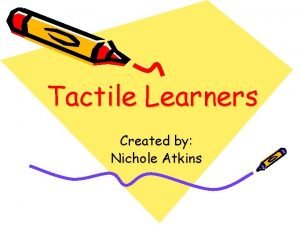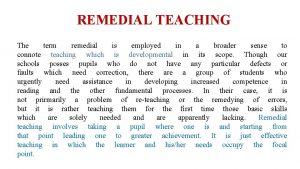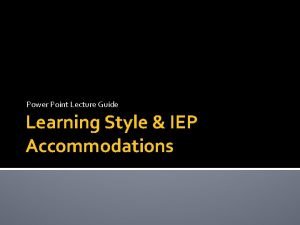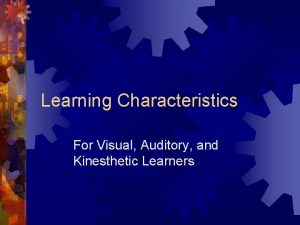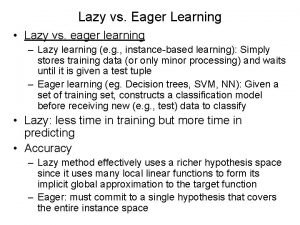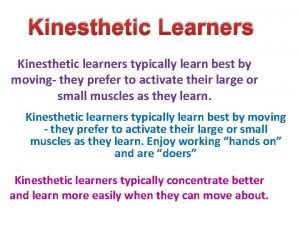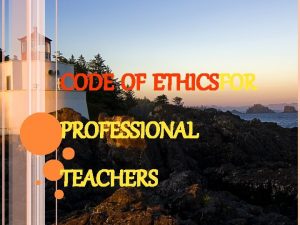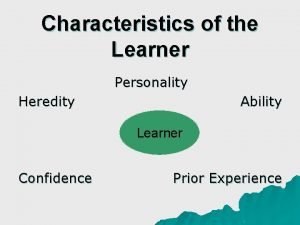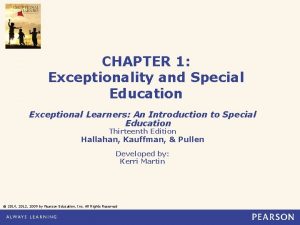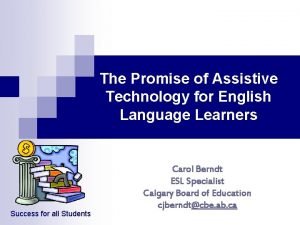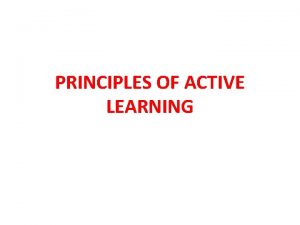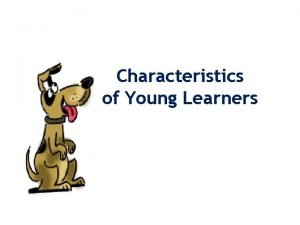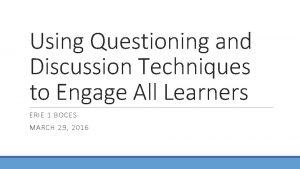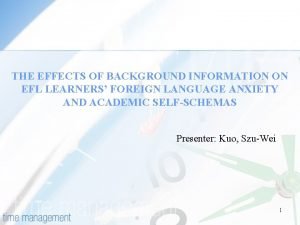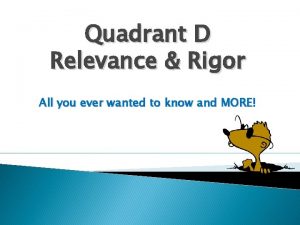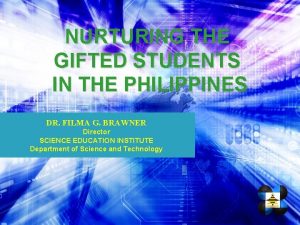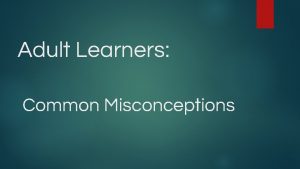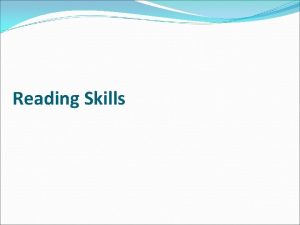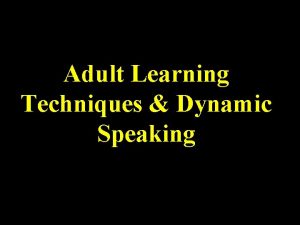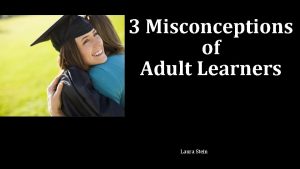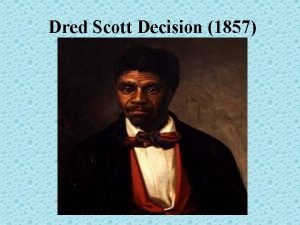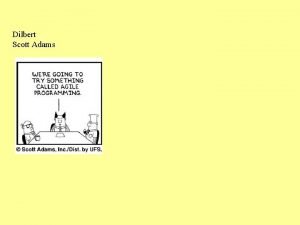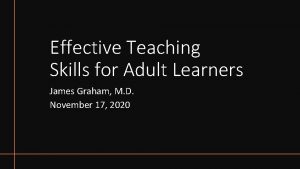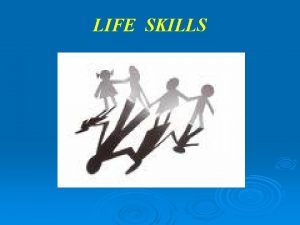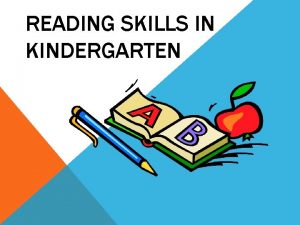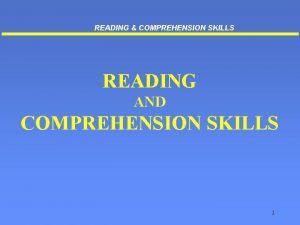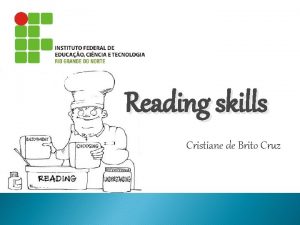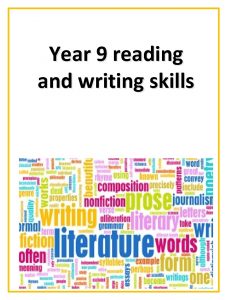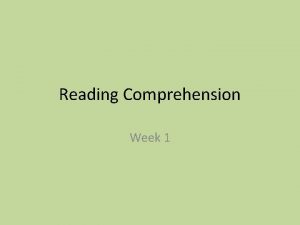Reading Skills for Adult Learners Scott Rice Instructor























- Slides: 23

Reading Skills for Adult Learners Scott Rice Instructor and Volunteer Coordinator, Seattle Goodwill Sally von Bargen Volunteer Instructor, Interim CDA & Helping Link

W elcome and Introduction What you can expect from today’s workshop A 90 minute dive into a very complex and often embarrassing subject You will gain insight into… • the complexities of learning to read as an adult • the Five Skills required to read • how to assess your student's reading level and know where to start

The Literacy Facts of Life The Nation Among ‘high income’ countries; US ranks 12 th The Economy Between 46 and 51% of American adults have an income well below the poverty level because of their inability to read Impact on Society 3 out of 5 people in American prisons can’t read

Goodwill Reading Skills Lab Our Reading class has 10 students per 8 week session. One teacher and four tutors supporting the class. We work: • one-on-one • in small groups based on reading level • as a whole class learning community We have learned there is no ideal single method for teaching reading. Our students come with: • a range of English language and reading skill levels • diverse needs and goals • varied education experiences and learning abilities • complex personal situations* * Our challenge is sustaining student attendance. Adults lead demanding lives!

Adult Reading Student Characteristics ESOL • limited or no reading ability in their first language • limited education opportunity in native country • English speaking and listening skills above reading and writing skills • sight word recognition with limited comprehension of English alphabet, phonics and decoding • possible background of trauma, violence or upheaval Native Speaking • • • interrupted or ineffective K 12 experiences possible background of violence, abuse, addiction or incarceration may have mild or undiagnosed learning disabilities

Students Lead Demanding Lives Adult students are highly motivated, yet will put family or job related obligations ahead of their educational needs. They will miss class if the demands of the ‘real world’ are too great. How can you establish a meaningful connection to motivate your student to return through thick and thin?

Why do we read? Think back on the last 24 hours. What did you read and what was your purpose for reading?

Why do we read? Think back on the last 24 hours. What did you read and what was your purpose for reading? The goal of reading is always COMPREHENSION

Jll Jbiut Jdjm (handout) Jdjm qs j studznt jt ‡iidwqll. Hz qs studyqn‡ rzjdqn‡ ti qmprivz hqs rzjdqn‡ skqlls jnd przpjrz fir cillz‡z qn thz Sprqn‡. Hz qs qntzrzstzd qn Qnfirmjtqin Tzchnili‡y jnd wjnts ti wirks wqth cimputzrs qn thz futurz. Hqs hibby qs pljyqn‡ sicczr. Hz pljys in j tzjm wqth pljyzrs frim mjny ciuntrqzs, qncludqn‡ Mzxqci, Russqj, Frjncz jnd zvzn Mjlq qn Jfrqcj. Jdjm qs frim Cinjkq‡, thz cjpqtjl cqty if ‡uqnzj. Hz cjmz ti thz Unqtzd Stjtzs qn 2014 wqth hqs thrzz sqblqn‡s. Thz fjmqly lqvzs qn Szjttlz, Wjshqn‡tin. Hqs bqj brithzr, Kjnfjlqz, wirks jt Jmjzin. Hqs sqstzr, Jnsur, jnd hqs lqttlz brithzr, Kjdz, jrz qn hq‡h schiil. Jnsur ‡izs ti Frjnklqn jnd Kjdz ‡izs ti Rjqnzr Bzjch. Jdjm livzs hqs fjmqly; thzy jrz jlwjys thzrz fir zjch ithzr. Jdjm jlsi livzs ti rzjd biiks, mj‡jzqnzs jnd nzwspjpzrs. Hz znjiys rzjdqn‡ jbiut hqs fjvirqtz sicczr tzjm, Mjnchzstzr Unqtzd. Whjt hjvz yiu lzjrnzd jbiut Jdjm? Whjt qs hibby? __________________ Whjt dizs Jdjm livz ti rzjd? _______________ Hiw mjny sqblqn‡s dizs hz hjvz? _____________

All About Adam is a student at Goodwill. He is studying reading to improve his reading skills and prepare for college in the Spring. He is interested in Information Technology and wants to works with computers in the future. His hobby is playing soccer. He plays on a team with players from many countries, including Mexico, Russia, France and even Mali in Africa. Adam is from Conakig, the capital city of Guinea. He came to the United States in 2014 with his three siblings. The family lives in Seattle, Washington. His big brother, Kanfalie, works at Amazon. His sister, Ansur, and his little brother, Kade, are in high school. Ansur goes to Franklin and Kade goes to Rainer Beach. Adam loves his family; they are always there for each other. Adam also loves to read books, magazines and newspapers. He enjoys reading about his favorite soccer team, Manchester United. What have you learned about Adam? What is hobby? __________________ What does Adam like to read? ______________ How many siblings does he have? ____________

What Does It Take Read?

The Five Reading Skills COMPREHENSION is the ability to understand spoken and written language and to use knowledge to construct meaning. VOCABULARY is the knowledge of word meaning. Educators often consider four types of vocabulary: listening, speaking, reading, and writing. Listening vocabulary refers to the words we need to know to understand what we hear. Speaking vocabulary consists of the words we use when we speak. Reading vocabulary refers to the words we need to know to understand what we read. Writing vocabulary consists of the words we use in writing. Vocabulary plays a fundamental role in the reading process, and contributes greatly to a reader's comprehension. A reader cannot understand a text without knowing what most of the words mean. FLUENCY is the ability to read accurately, at a natural pace and with appropriate expression. DECODING is the ability to apply knowledge of letter-sound relationships, including knowledge of letter patterns, to correctly pronounce written words. Understanding these relationships gives readers the ability to recognize familiar words and to figure out words they haven't seen. Phonics, refers to the knowledge of letter sounds, syllable patterns, and the rules used to decode. Decoding also includes using titles, illustrations and graphics as comprehension ques. PHONEMIC AWARENESS is the ability to hear individual sounds and know that sounds are related to letters in the alphabet that can be changed in sequence to form/write different words.

Reading Comprehension Strategies Adult reading students struggle with… ü understanding that comprehension is the goal, reading words on a page is not the end game ü knowing how to learn, it is helpful to help students link what they learn in formal tutoring to practice and practical experiences in their daily lives ü unknown vocabulary 1. first silent read (scan) to identify new words 2. underline new words 3. then read for comprehension ü a lack of comprehension strategies • silent reading (scanning) • pictures • titles • linking to background knowledge

Where to Start? Identify Student Learning Goal Every student has a unique reason or need for wanting to learn to read. 1. Discover why your student wants to read? 2. Tailor and sequence your lessons into small components to achieve your student’s goals.

Student Goal & Learning Plan Eduardo wants to get a painting job Eduardo grew up in a troubled family, dropped out of school at 15 and never learned how to read well. He can sight read a lot of everyday words but struggles to read. He knows the alphabet and some letter sounds, but does not understand phonics. He wants a painting job, he knows he can do the work, but he also knows his prospects are limited because he is a his poor reader. He collaborated with his tutor to develop his sequential Learning Plan. read labels and directions read and practice answering interview questions read and prepare a resume read online want ads SKILL FOCUS - Phonics and Decoding Practice read and fill out a job application get a painting job

Flexible Lesson Planning Know where you’re going and be flexible. 1. Discover why your student wants to read and what your student needs to read 2. Connect with your student to build up trust, mutual respect and friendship 3. Link homework or past week’s learning to real world experiences 4. Practice reading strategies 5. Encourage reading for pleasure and purpose 6. Extend learning into ’real world’

Use Real World Material Use reading material that your student wants and needs to read.

Use Real World Material Use reading material that your student wants and needs to read. newspapers bus schedules flyers children’s books applications online classified ads ications school commun mail sports pages recipes maps grocery ads street signs

Student Stories No books? No Problem, write a story! Methods: Do Whatever Makes Sense Multiple topics allow for multiple stories (about me, my family, my reason for learning to read, why I quite smoking, my favorite movie etc. ) – student simply speaks and teacher writes, or class brainstorms, or students talk about each other – student’s spoken vocabulary is always used – student writes, reads and revises • • • vocabulary reviewed teacher reads, as student reads silently story proofed, edited and expanded student reads and rereads for fluency story can be expanded as student progresses – student writes & rewrites – collaborative editing

Student Stories

Wrap Up Q&A Evaluations Thanks!

Tutor Resources pg 1 Websites (reading resources and lesson plans) Minnesota Literacy Council, https: //mnliteracy. org/curriculum-lesson-plans EL Civics for ESL Students, http: //www. elcivics. com/worksheets/reading. html Literacy Information and Communication System, https: //lincs. ed. gov English for Everyone, http: //www. englishforeveryone. org Marshall Adult Educaiton, http: //resources. marshalladulteducation. org/reading_skills_home. htm Publishers Grass Roots Press, http: //www. grassrootsbooks. net/us/ New Readers Press, http: //www. newreaderspress. com Books (shop around, many can be purchased used) Litstart: Strategies for Adult Literacy and ESL Tutors, Patricia Fry, Michigan Literacy, Inc. Teaching Adults: An ESL Resource Book, New Readers Press Teaching Adults: A Literacy Resource Book, New Readers Press Tutor: A Collaborative Learner-Centered Approach to Literacy Instruction For Teens and Adults, Ruth Johnson Colvin, New Readers Press You Can Teach Someone to Read, Lorraine Peoples, GLo. Books Publishing LLC

Tutor Resources pg 2 Online Resources (Tutor support, adult learning, literacy facts, lessons plans, learning activities) 1. PDF Understanding What Reading Is All About, Ashley Hager et al, National Center of Study of Adult Learning and Literacy http: //files. eric. ed. gov/fulltext/ED 508600. pdf 2. PDF Reading for Life, Pre Literacy Activities Volume 1, Linda Strand, https: //mnliteracy. org/sites/default/files/reading_for_life_volume_one. pdf 3. PDF Reading for Life, Pre Literacy Activities Volume 2, Linda Strand, https: //mnliteracy. org/sites/default/files/reading_for_life_volume_two. pdf 4. PDF “Making It Real: Teaching Pre-Literate Adult Refugee Students” http: //www. tacommunityhouse. org/wp-content/uploads/2014/08/Making-it-Real. pdf 5. PDF Demystifying Adult Literacy for Volunteer Tutors, Charlene L. Bell https: //www. cyberdriveillinois. com/departments/library/literacy/oltt/pdfs/demystifying_adult_literacy. pdf 6. PDF Tutor Handbook LA Public Library https: //www. lapl. org/sites/default/files/media/pdf/Tutor_Handbook. pdf 7. PDF ABE New Teacher Resource Guide http: //www. calproonline. org/documents/resourceguides/ABE%20 Resource%20 Guide%20 Revised%2009242008. pdf 8. PDF Making It Real: Teaching Pre-Literate Adult Refugee Students, Alysan Croydon, Tacoma Community House Training Project http: //www. tacommunityhouse. org/wp-content/uploads/2014/08/Makingit-Real. pdf
 Reading strategies for english language learners
Reading strategies for english language learners Pre reading while reading and post reading activities
Pre reading while reading and post reading activities Scott foresman reading street grade 4
Scott foresman reading street grade 4 Sra4kids
Sra4kids Global vs analytical learners
Global vs analytical learners Grammar examples
Grammar examples Nichole atkins
Nichole atkins A teacher should adopt “remedial teaching” for:
A teacher should adopt “remedial teaching” for: Global vs analytical learners
Global vs analytical learners Kinesthetic characteristics
Kinesthetic characteristics Eager learner vs lazy learner
Eager learner vs lazy learner Kinesthetic learning
Kinesthetic learning When is cognitivism beneficial for learners
When is cognitivism beneficial for learners Diversity of learning domain
Diversity of learning domain Resolution no. 435, series of 1997
Resolution no. 435, series of 1997 Inheritance characteristics
Inheritance characteristics Exceptional learners: an introduction to special education
Exceptional learners: an introduction to special education Assistive technology for english language learners
Assistive technology for english language learners Principles of active learning
Principles of active learning Involuntary attention meaning
Involuntary attention meaning 3b using questioning and discussion techniques
3b using questioning and discussion techniques Background information for learners
Background information for learners Rigor/relevance framework
Rigor/relevance framework Gifted school in the philippines
Gifted school in the philippines
